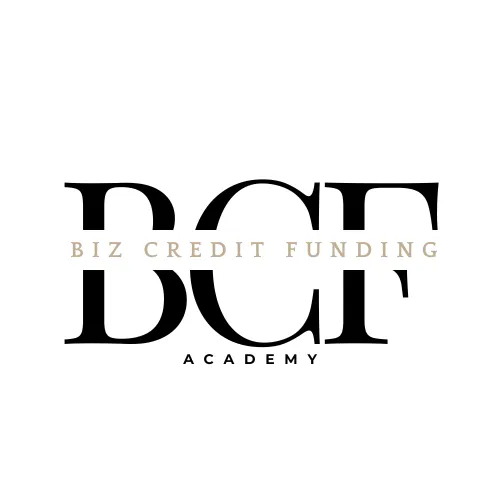About Us

WHO WE ARE
Dedicated to excellence and service.
Our mission is to empower entrepreneurs to achieve their biggest business goals with proper funding. We help business owners find the credit, capital, and support needed to establish and grow a thriving business.
Get access to up to $150k in business credit lines, Traditional Financing such as SBA Financing, and the widest selection of Alternative Business Lending products. Plus we empower your growth with coaching, motivation and accountability, and a community of like-minded business owners. We go beyond just financing – we give you the tools and support needed to take your business to the next level. Let’s work together to fund your dreams a reality.
Live Expert Coaching and Support
Personalized Funding Strategy
24/7 Online Access

How to Separate Personal and Business Credit—Even If You’re Just Starting Out
If you’re a small business owner using your personal credit cards, personal loans, or even your personal checking account for business—it’s time to stop.
Mixing personal and business credit may seem convenient in the short term, but it can lead to big problems down the road. It puts your personal assets at risk, hurts your ability to qualify for business funding, and makes tax time a mess.
The good news? You can separate your personal and business credit quickly—even if you’re starting from scratch.
In this guide, you’ll learn exactly why separation matters and how to do it step-by-step.
Why Separating Business and Personal Credit Is So Important
When you separate your finances and credit history, you do more than just “stay organized.” You actually:
Protect your personal credit score from business-related debt or missed payments
Build your business credit profile (which is key to getting funding and better terms)
Limit your personal liability by creating a legal distinction between you and your business
Look more professional and credible to lenders, vendors, and clients
If everything runs through your personal accounts, you’re personally responsible for every dollar of business activity—whether it works out or not.
Step 1: Choose the Right Business Structure
You can’t truly separate personal and business credit if your business isn’t legally separate.
✅ Best option:
Form an LLC (Limited Liability Company) or Corporation—both create a distinct legal entity for your business.
✅ Avoid:
Running everything as a sole proprietor if your goal is to build business credit and limit liability.
Step 2: Get an EIN (Employer Identification Number)
Your EIN is like a Social Security Number—but for your business. It’s required for most official business transactions and applications.
✅ How to get it:
Apply for free on the IRS website: https://irs.gov/ein
This number is required to open a business bank account, apply for credit, and file taxes separately.
Step 3: Open a Business Bank Account
This is one of the most important (and often skipped) steps.
Use your new EIN and business formation documents to open a dedicated business checking account.
✅ Only deposit business income into this account
✅ Pay business expenses from this account
✅ Don’t mix personal purchases or payments here
This financial firewall keeps your records clean and shows lenders you're running a real operation.
Step 4: Get a Business Credit Card or Net-30 Accounts
Now that your business is officially separate, it’s time to start building its own credit profile.
✅ Apply for a business credit card
Start with banks that work with new businesses or consider using your personal credit to get a card in your business’s name.
✅ Open Net-30 accounts with vendors
These accounts offer 30-day terms and report payment history to business credit bureaus—helping you establish credit fast.
Step 5: Monitor Business Credit Separately
Business credit is tracked by Dun & Bradstreet, Experian Business, and Equifax Business. You’ll want to monitor your business reports independently from your personal credit.
✅ Use tools like NAV or direct subscriptions
✅ Track your PAYDEX score (D&B) and other metrics
✅ Dispute any inaccurate or missing tradelines
What to Avoid When Separating Credit
🚫 Using your Social Security Number on business applications
Always use your EIN unless a personal guarantee is truly required.
🚫 Mixing funds between personal and business accounts
This can result in a legal and tax headache (or worse, pierce your liability protection).
🚫 Ignoring your business credit score
It matters just as much as your personal score when it comes to larger loans or credit lines.
Separation = Scalability
When your business stands on its own, it opens the door to:
Easier funding approvals
Higher credit limits
Lower interest rates
More financial credibility and protection
And when your business credit is strong, your personal credit doesn’t need to carry the weight.
Want a Simple Plan to Separate and Strengthen Your Business Credit?
We help business owners go from commingled to compliant—and fundable. If you're ready to build a credit-worthy business the right way, we’ll guide you through every step.
👉 Schedule a free consultation now and take control of your business finances.
OUR EXPERTISE
Dedicated to Finding You The Best Funding
Get the expert guidance you need to find the best funding option for your growing business. Let’s create the perfect funding plan to get your business the money it needs to grow!
OUR BLOG
Latest News & Article

How to Separate Personal and Business Credit—Even If You’re Just Starting Out
If you’re a small business owner using your personal credit cards, personal loans, or even your personal checking account for business—it’s time to stop.
Mixing personal and business credit may seem convenient in the short term, but it can lead to big problems down the road. It puts your personal assets at risk, hurts your ability to qualify for business funding, and makes tax time a mess.
The good news? You can separate your personal and business credit quickly—even if you’re starting from scratch.
In this guide, you’ll learn exactly why separation matters and how to do it step-by-step.
Why Separating Business and Personal Credit Is So Important
When you separate your finances and credit history, you do more than just “stay organized.” You actually:
Protect your personal credit score from business-related debt or missed payments
Build your business credit profile (which is key to getting funding and better terms)
Limit your personal liability by creating a legal distinction between you and your business
Look more professional and credible to lenders, vendors, and clients
If everything runs through your personal accounts, you’re personally responsible for every dollar of business activity—whether it works out or not.
Step 1: Choose the Right Business Structure
You can’t truly separate personal and business credit if your business isn’t legally separate.
✅ Best option:
Form an LLC (Limited Liability Company) or Corporation—both create a distinct legal entity for your business.
✅ Avoid:
Running everything as a sole proprietor if your goal is to build business credit and limit liability.
Step 2: Get an EIN (Employer Identification Number)
Your EIN is like a Social Security Number—but for your business. It’s required for most official business transactions and applications.
✅ How to get it:
Apply for free on the IRS website: https://irs.gov/ein
This number is required to open a business bank account, apply for credit, and file taxes separately.
Step 3: Open a Business Bank Account
This is one of the most important (and often skipped) steps.
Use your new EIN and business formation documents to open a dedicated business checking account.
✅ Only deposit business income into this account
✅ Pay business expenses from this account
✅ Don’t mix personal purchases or payments here
This financial firewall keeps your records clean and shows lenders you're running a real operation.
Step 4: Get a Business Credit Card or Net-30 Accounts
Now that your business is officially separate, it’s time to start building its own credit profile.
✅ Apply for a business credit card
Start with banks that work with new businesses or consider using your personal credit to get a card in your business’s name.
✅ Open Net-30 accounts with vendors
These accounts offer 30-day terms and report payment history to business credit bureaus—helping you establish credit fast.
Step 5: Monitor Business Credit Separately
Business credit is tracked by Dun & Bradstreet, Experian Business, and Equifax Business. You’ll want to monitor your business reports independently from your personal credit.
✅ Use tools like NAV or direct subscriptions
✅ Track your PAYDEX score (D&B) and other metrics
✅ Dispute any inaccurate or missing tradelines
What to Avoid When Separating Credit
🚫 Using your Social Security Number on business applications
Always use your EIN unless a personal guarantee is truly required.
🚫 Mixing funds between personal and business accounts
This can result in a legal and tax headache (or worse, pierce your liability protection).
🚫 Ignoring your business credit score
It matters just as much as your personal score when it comes to larger loans or credit lines.
Separation = Scalability
When your business stands on its own, it opens the door to:
Easier funding approvals
Higher credit limits
Lower interest rates
More financial credibility and protection
And when your business credit is strong, your personal credit doesn’t need to carry the weight.
Want a Simple Plan to Separate and Strengthen Your Business Credit?
We help business owners go from commingled to compliant—and fundable. If you're ready to build a credit-worthy business the right way, we’ll guide you through every step.
👉 Schedule a free consultation now and take control of your business finances.
Testimonials
Real results from business owners just like you

Cheryl Reisner, a former bank lender from Shreveport, Louisiana. The suite’s business credit building process unlocked more funding options than she ever imagined, opening up new possibilities for her business. Cheryl believes every business owner can benefit from the Business Finance Suite, as it revolutionizes how they operate.

Louis, a Miami-based business owner found success using the Business Finance Suite, which helped establish a business credit profile. This enabled them to apply for funding without using their Social Security number, eliminating personal liability for credit applications. The speaker highly recommends this program to fellow business owners.

Edward from El Paso, Texas, struggled to secure funding for his small businesses until discovering the Business Finance Suite. Within a month, the suite helped set up his business correctly, establish trade lines and revolving credit, and now he’s on track to receive funding. Edward guarantees it’s worth the investment and only wishes he’d found it sooner.

